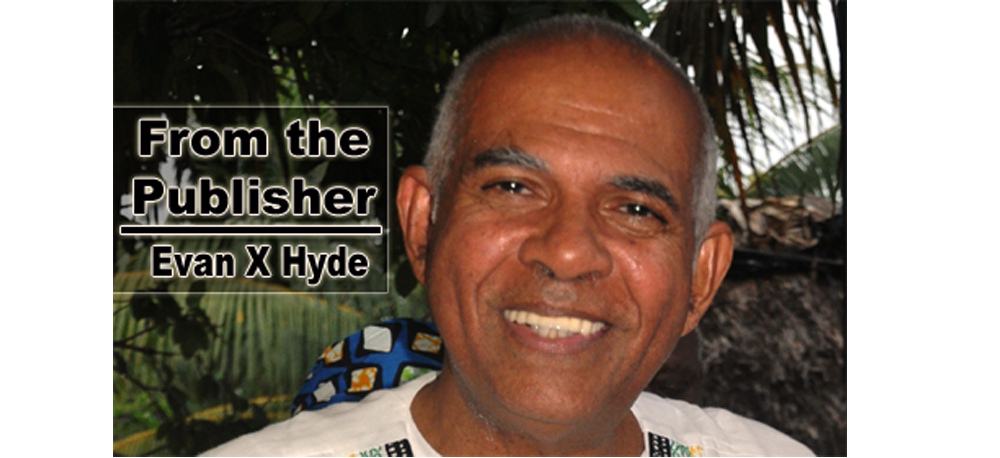In the 1974 general election, I ran as the single UBAD Party candidate in the Collet constituency. At that time, Collet included much of what is now Lake Independence, Collet, and Queen’s Square. The other candidates were V. H. Courtenay, the incumbent from the ruling People’s United Party, and Ken Tillett, from the Opposition United Democratic Party (UDP).
I did not expect to win the Collet seat. I ran as a kind of farewell to arms, because UBAD had been split in two in early 1973, and had slowly become almost irrelevant. But there were a few people who were very much loyal to me, and I felt, whether sensibly or not, that a doomed run in Collet on my part would indicate to my loyalists that this UBAD ride was over.
I received 4.1 per cent of the votes cast, 89 in total, and the PUP’s Harry Courtenay defeated the UDP’s Ken Tillett by a single vote. The UDP leadership conveniently exploited the situation to blame me and my 89 votes for Mr. Tillett’s loss.
In the 1989 general election, Rufus X, a former UBAD officer who had been a UDP loyalist from the party’s formation in 1973 until he was rejected in 1987 as a Belize Rural North candidate by the UDP Esquivel leadership, ran as an Independent candidate for Belize Rural North. Rufus received 3.9 per cent of the votes in that election.
As a result of these two elections, I developed a personal theory that about 4 per cent of the voters in Belize are supportive of the views that have been expressed by Rufus and myself over the years.
In 2020, my second son, Cordel, became the Deputy Prime Minister of Belize after winning the Lake Independence seat for the PUP for the fifth time. The PUP Cabinet, in which Cordel is second to the Prime Minister, is the official decision-making body of the nation of Belize.
The Cabinets of Belize, both PUP and UDP, have not been aggressive when it comes to Guatemalan incursions in the Chiquibul forest and the Columbia Forest Reserve, and on the Sarstoon River. Some would say our governments have been reasonable. But there are some who would consider our governments timid in the face of the bully.
The Guatemalan claim to Belize, and Guatemalan behavior along and inside of Belize’s borders are very delicate issues because both Guatemala and Belize know that Guatemala is much more powerful than Belize militarily.
The views I express here are for the benefit of our roughly 4 percent loyalists, because the official Government of Belize position is always what the majority of Belizeans have to respect.
I heard someone say on a talk show that Guatemala has been in contempt of court, because their claim to Belize has been submitted to the International Court of Justice (ICJ) for arbitration. So that, strictly speaking, Guatemala should be ensuring that their citizens and their military respect the established borders of Belize, as defined in the Treaty of 1859. But Guatemala has been allowing its citizens and military to behave recklessly when it comes to Belize’s territory.
The Government of Belize is not in a position to confront Guatemala militarily, so all exchanges between the governments of the two nations during Belize’s 43 years of political independence have been strictly diplomatic, so to speak.
When the British granted Belize political independence in 1981, they refused to give us a defence guarantee. During the British colonial era, Guatemala had been pretty well-behaved with respect to Belize. Today there is only a token British presence in Belize, called BATSUB, and they were not in place over the weekend at the mouth of the Sarstoon River, when the Guatemalan military (or navy) rammed a Belizean boat with Belizean passengers three times in the Belizean section of the Sarstoon.
A nearby Belizean military presence did not respond to the Guatemalan behavior, reportedly because of engine problems.
We are, as a nation, in what the obeah woman used to call “a tricky spot” here. We speak in a strictly military sense: our independence and sovereignty are not viable under the circumstances.
If the British will not intervene, and it appears that they will not, then Belizeans have to turn to the American government, because Washington is the powerhouse of the Hemisphere, and of the world indeed. Incidentally, there was an occasion when the ruling PUP had a couple left wing Cabinet Ministers in place after independence in 1981, when an American official warned the Belize government not to encourage trade with communist nations in the region and in the world. The American official warned Belizean officials that Washington would ignore Guatemalan aggression if Belize became too cosy with communists.
Israel is a prime-time American ally, so it may be that Belize’s condemnation of Israeli excesses in the Gaza territory irked the State Department.
This column, as I have said, is intended specifically for our “4 percent.” The Government of Belize is in a tricky spot, to repeat, and it is not for a newspaper columnist to tell them what to do and what not to do.

